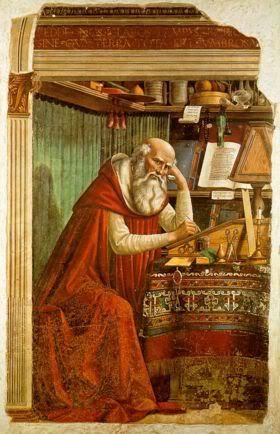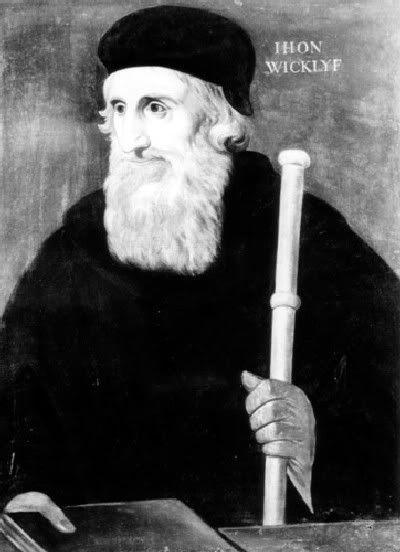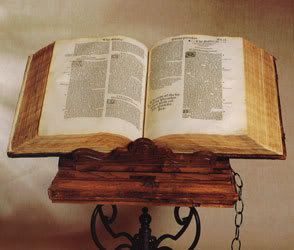How Did we Get our English Bible?
How Did we Get our English Bible? 02
Early Translations
Latin Vulgate (4th century). In 382, Pope Damascus asked Jerome to complete a new Latin translation of the Bible. He finished the Gospels (from the original Greek), and then switched to the Old Testament. At first, he began to translate them from the Septuagint, but later went back to the original Hebrew. He never really finished the New Testament and it was finished shortly after he died. The Vulgate was immediately controversial to many churches in the East who were very familiar with the Septuagint. This linguistic difference will add to a growing split between East (Constantinople) and West (Rome) which will finally officially separate in 1054. In the West, however, the Vulgate was hugely popular. "Vulgate" refers to the "vulgar" language, that is, the language of the people. It was the "NIV" of the day. Everyone could understand what was being read in church, and they loved it. Rome adopted it as the official translation of the Church.

As the Vulgate was copied over and over again, many errors crept in. When presented with two different manuscripts from which to copy, it was difficult to know which was "original" and which was an error. So, errors were commonly passed from one generation to another geographically. As the centuries continued, the number of differences between manuscripts mounted. In response, the Catholic Church authorized a process of consolidating the variants and finally ended up with the Clementine Vulgate in 1592 (during the Protestant Reformation). This version was able to be mass-produced and is the version of the Bible that many pre-Vatican II (1962-1965) Roman Catholics are familiar with. In 1979, Pope John Paul II announced the completion of the most current version, the Nova Vulgata, which is used today in all Latin Roman Catholic services.
The Vulgate was the Bible in the West for over 1000 years. It was the basis for many subsequent translations into many other languages. The earliest English translations of the Bible (by the Venerable Bede) were from the Vulgate. Wycliffe's translation was from the Vulgate. It was highly influential in Luther's translation to German, and later to the Coverdale Bible and even the King James Version (but I'm getting ahead of myself).
John Wycliffe (c.1328-1384), "the Morningstar of the Reformation," was born into a time and culture depicted by Monty Python in the Holy Grail (not completely accurately, but helpful in some ways). The Roman church ruled, but was troubled. The Pope had fled to Avingon, France (England's enemy!) for most of the century. There were rival popes (up to three at a time!). The English governmental officials and church clergy were mixed and it was common for one person to be the appointed authority of the church and the state. Nepotism ruled and the peasants and farmers were incredibly suspicious and angry with the few wealthy and powerful who not only controlled their land, but also their souls -- but what could they do? John Wycliffe was educated at Oxford University and became a Roman Catholic priest with a mind of his own. He rejected the doctrine of transubstantiation (which was widely taught, but not clearly defined until the Council of Trent in 1551, long after Wycliffe). He also rejected the papal authority -- he taught that the Bible is our highest authority. For example,
Those Heretics who pretend that the laity need not know God’s law but that the knowledge which priests have had imparted to them by word of mouth is sufficient, do not deserve to be listened to. For Holy Scriptures is the faith of the Church, and the more widely its true meaning becomes known the better it will be. Therefore since the laity should know the faith, it should be taught in whatever language is most easily comprehended… [After all,] Christ and His apostles taught the people in the language best known to them.

Wycliffe worked on a translation of the New Testament and encouraged others to work on the Old Testament (all from the Vulgate). It was the first full English translation of the Bible. Even though it was a terrible translation (it was so literal to the Latin, at places it makes no sense in English) it had a huge impact. Shortly after his death, reading the Bible in English was outlawed and many of Wycliffe's followers (the Lollards) were burned at the stake (sometimes with copies of the English Bible hanging from their neck). In 1428, 43 years after he died, Wycliffe's bones were dug up, burned and the ashes scattered on the River Swift, on the Pope's orders.
One of Wycliffe's followers, John Huss was a Czech Roman Catholic Priest who also taught that the Bible should be read in one's own language (he also did a lot of wonderful things for the advancement of Czech culture in general). He was eventually burned at the stake in 1415 with copies of Wycliffe's Bibles used as kindling. His last words, "in 100 years, God will raise up a man whose calls for reform cannot be suppressed."
The late 1400's were a time of amazing transition. In 1453, the Turks invaded Byzantium (formerly Constantinople). Greek scholars moved to the West and re-introduced the Greek manuscripts of the Bible to Western scholars. In 1454 Gutenberg published the first book on his printing press, the Latin Vulgate. This invention would change Bible publication forever. Then, in 1516, the first Greek New Testament is published on the printing press, giving access to the Greek New Testament to a wide audience of scholars. One year later, Martin Luther published his 95 thesis and began the Protestant Reformation. That same year, seven people were burned at the stake for teaching their children the Lord's Prayer in English, rather than Latin.
William Tyndale (1494-1536) was a brilliant linguist educated at both Oxford and Cambridge, fluent in at least six languages. Tyndale was as passionate about giving the Bible to the laity as Wycliffe was. After a few years of hiding his translational efforts he moved to Germany (there are reports that he met with Luther, but we don't know for sure). In the end he completed 5 different editions of the New Testament, but never completed the Old Testament. His New Testaments were printed on the continent and shipped to England in bales of cotton and sacks of flour. Everybody wanted one, even though it was illegal. The King of England put a bounty on every copy with an effort to burn every one. The bounty was large enough that Tyndale would actually "sell" copies this way in an effort to subsidize the cost of printing for the poor working class. Without knowing it, the King was giving copies of Tyndale's New Testament to every farmer in England!

He used Erasmus' third edition of the Greek text as the basis of his New Testament translation. This was the first English Bible printed, and the first English translation from the original languages. Also, he introduced the tradition of using italics for words not in the original language. This is still part of the NASB (1971 and 1995). His mastery of the English language included his coining the words: Jehovah, Passover, atonement, scapegoat, and beautiful (among many others). He is known as "the Architect of the English language." As one writer said, "His simple directness, his magical simplicity of phrase, his modest music, have given an authority to his wording that has imposed itself on all later versions.… Nine-tenths of the Authorized New Testament is still Tindale, and the best is still his.”
He was betrayed and arrested in 1535 and burned at the stake a year later for translating the Bible into English. His last words were, "Lord, open the King of England's eyes!"
Myles Coverdale (an associate of Tyndale) completed a translation of the Bible in 1535. He used Luther's German translation and the Vulgate as sources. It was the first complete printed English Bible. The Coverdale Bible was the first bible to include the Old Testament Apocrypha as an appendix to the Old Testament (rather than interspersed throughout).
Matthew's Bible (1537) was a compilation of Coverdale's and Tyndale's, with about 2000 notes. One study note on 1 Peter 3.7 says, "If [the wife] be not obedient and healpfull unto [her husband, he] endeavoureth to beate the feare of God into her…” Matthew's Bible soon became known as the "Wife-Beater's Bible." This was the first revision of Tyndale's Bible.
By this time, there were enough copies of the English Bible around, that it was impossible to squelch it. King Henry VIII decided to reverse national policy and gain the favor of the people by placing an English Bible in every church in England. The people loved it! The diversity of versions and printings created controversy, so Henry decided to create an authorized English Bible for everyone (to his own glory) -- one that would be as good a translation as Matthew's but without the notes. Coverdale took Matthew's text, deleted the notes, revised the English and it was published as the Great Bible in 1539. The "Great" refers to the enormous size of the book, rather than to its quality of translation or impact on society. Most of these Bibles were placed in the church and chained to the lectern to prevent theft. Rome was furious. These Bibles did not conform to the Vulgate (because they were based on Tyndale's translation of the original languages).

The Geneva Bible (1560) was completed by a group of scholars (for the first time in history) from England who had fled to Geneva (home of John Calvin) because of religious persecution from the new monarch of England, the Catholic, "Bloody" Mary who was burning all the English Bibles and all the Protestants. Although based largely on Tyndale's work, this was the first English Bible to be translated completely from the original languages. The translators included a large number of study notes that were decidedly Calvinistic. It was the first English version with verse divisions. It was used by both the Pilgrims who came to America and by William Shakespeare. It had a large influence upon the King James Version. In many ways it is superior to the King James, and was more popular for a long time (almost 100 editions were printed during the 45 years of Queen Elizabeth's reign), but in the end, political pressure raised the less-Calvinistic King James Bible over the Geneva Bible. The Geneva Bible was truly the Bible of the English Protestants.
The Rheims-Douai Bible (1610) was the "official" Catholic English translation. This was a concession to laity -- the lay people ought not to read the Bible, but if they do, it must be this translation, based on the Vulgate (Until Vatican II, all Catholic translations of any kind, were from the Vulgate, not the original languages).
Early Translations
Latin Vulgate (4th century). In 382, Pope Damascus asked Jerome to complete a new Latin translation of the Bible. He finished the Gospels (from the original Greek), and then switched to the Old Testament. At first, he began to translate them from the Septuagint, but later went back to the original Hebrew. He never really finished the New Testament and it was finished shortly after he died. The Vulgate was immediately controversial to many churches in the East who were very familiar with the Septuagint. This linguistic difference will add to a growing split between East (Constantinople) and West (Rome) which will finally officially separate in 1054. In the West, however, the Vulgate was hugely popular. "Vulgate" refers to the "vulgar" language, that is, the language of the people. It was the "NIV" of the day. Everyone could understand what was being read in church, and they loved it. Rome adopted it as the official translation of the Church.

As the Vulgate was copied over and over again, many errors crept in. When presented with two different manuscripts from which to copy, it was difficult to know which was "original" and which was an error. So, errors were commonly passed from one generation to another geographically. As the centuries continued, the number of differences between manuscripts mounted. In response, the Catholic Church authorized a process of consolidating the variants and finally ended up with the Clementine Vulgate in 1592 (during the Protestant Reformation). This version was able to be mass-produced and is the version of the Bible that many pre-Vatican II (1962-1965) Roman Catholics are familiar with. In 1979, Pope John Paul II announced the completion of the most current version, the Nova Vulgata, which is used today in all Latin Roman Catholic services.
The Vulgate was the Bible in the West for over 1000 years. It was the basis for many subsequent translations into many other languages. The earliest English translations of the Bible (by the Venerable Bede) were from the Vulgate. Wycliffe's translation was from the Vulgate. It was highly influential in Luther's translation to German, and later to the Coverdale Bible and even the King James Version (but I'm getting ahead of myself).
John Wycliffe (c.1328-1384), "the Morningstar of the Reformation," was born into a time and culture depicted by Monty Python in the Holy Grail (not completely accurately, but helpful in some ways). The Roman church ruled, but was troubled. The Pope had fled to Avingon, France (England's enemy!) for most of the century. There were rival popes (up to three at a time!). The English governmental officials and church clergy were mixed and it was common for one person to be the appointed authority of the church and the state. Nepotism ruled and the peasants and farmers were incredibly suspicious and angry with the few wealthy and powerful who not only controlled their land, but also their souls -- but what could they do? John Wycliffe was educated at Oxford University and became a Roman Catholic priest with a mind of his own. He rejected the doctrine of transubstantiation (which was widely taught, but not clearly defined until the Council of Trent in 1551, long after Wycliffe). He also rejected the papal authority -- he taught that the Bible is our highest authority. For example,
Those Heretics who pretend that the laity need not know God’s law but that the knowledge which priests have had imparted to them by word of mouth is sufficient, do not deserve to be listened to. For Holy Scriptures is the faith of the Church, and the more widely its true meaning becomes known the better it will be. Therefore since the laity should know the faith, it should be taught in whatever language is most easily comprehended… [After all,] Christ and His apostles taught the people in the language best known to them.

Wycliffe worked on a translation of the New Testament and encouraged others to work on the Old Testament (all from the Vulgate). It was the first full English translation of the Bible. Even though it was a terrible translation (it was so literal to the Latin, at places it makes no sense in English) it had a huge impact. Shortly after his death, reading the Bible in English was outlawed and many of Wycliffe's followers (the Lollards) were burned at the stake (sometimes with copies of the English Bible hanging from their neck). In 1428, 43 years after he died, Wycliffe's bones were dug up, burned and the ashes scattered on the River Swift, on the Pope's orders.
One of Wycliffe's followers, John Huss was a Czech Roman Catholic Priest who also taught that the Bible should be read in one's own language (he also did a lot of wonderful things for the advancement of Czech culture in general). He was eventually burned at the stake in 1415 with copies of Wycliffe's Bibles used as kindling. His last words, "in 100 years, God will raise up a man whose calls for reform cannot be suppressed."
The late 1400's were a time of amazing transition. In 1453, the Turks invaded Byzantium (formerly Constantinople). Greek scholars moved to the West and re-introduced the Greek manuscripts of the Bible to Western scholars. In 1454 Gutenberg published the first book on his printing press, the Latin Vulgate. This invention would change Bible publication forever. Then, in 1516, the first Greek New Testament is published on the printing press, giving access to the Greek New Testament to a wide audience of scholars. One year later, Martin Luther published his 95 thesis and began the Protestant Reformation. That same year, seven people were burned at the stake for teaching their children the Lord's Prayer in English, rather than Latin.
William Tyndale (1494-1536) was a brilliant linguist educated at both Oxford and Cambridge, fluent in at least six languages. Tyndale was as passionate about giving the Bible to the laity as Wycliffe was. After a few years of hiding his translational efforts he moved to Germany (there are reports that he met with Luther, but we don't know for sure). In the end he completed 5 different editions of the New Testament, but never completed the Old Testament. His New Testaments were printed on the continent and shipped to England in bales of cotton and sacks of flour. Everybody wanted one, even though it was illegal. The King of England put a bounty on every copy with an effort to burn every one. The bounty was large enough that Tyndale would actually "sell" copies this way in an effort to subsidize the cost of printing for the poor working class. Without knowing it, the King was giving copies of Tyndale's New Testament to every farmer in England!

He used Erasmus' third edition of the Greek text as the basis of his New Testament translation. This was the first English Bible printed, and the first English translation from the original languages. Also, he introduced the tradition of using italics for words not in the original language. This is still part of the NASB (1971 and 1995). His mastery of the English language included his coining the words: Jehovah, Passover, atonement, scapegoat, and beautiful (among many others). He is known as "the Architect of the English language." As one writer said, "His simple directness, his magical simplicity of phrase, his modest music, have given an authority to his wording that has imposed itself on all later versions.… Nine-tenths of the Authorized New Testament is still Tindale, and the best is still his.”
He was betrayed and arrested in 1535 and burned at the stake a year later for translating the Bible into English. His last words were, "Lord, open the King of England's eyes!"
Myles Coverdale (an associate of Tyndale) completed a translation of the Bible in 1535. He used Luther's German translation and the Vulgate as sources. It was the first complete printed English Bible. The Coverdale Bible was the first bible to include the Old Testament Apocrypha as an appendix to the Old Testament (rather than interspersed throughout).
Matthew's Bible (1537) was a compilation of Coverdale's and Tyndale's, with about 2000 notes. One study note on 1 Peter 3.7 says, "If [the wife] be not obedient and healpfull unto [her husband, he] endeavoureth to beate the feare of God into her…” Matthew's Bible soon became known as the "Wife-Beater's Bible." This was the first revision of Tyndale's Bible.
By this time, there were enough copies of the English Bible around, that it was impossible to squelch it. King Henry VIII decided to reverse national policy and gain the favor of the people by placing an English Bible in every church in England. The people loved it! The diversity of versions and printings created controversy, so Henry decided to create an authorized English Bible for everyone (to his own glory) -- one that would be as good a translation as Matthew's but without the notes. Coverdale took Matthew's text, deleted the notes, revised the English and it was published as the Great Bible in 1539. The "Great" refers to the enormous size of the book, rather than to its quality of translation or impact on society. Most of these Bibles were placed in the church and chained to the lectern to prevent theft. Rome was furious. These Bibles did not conform to the Vulgate (because they were based on Tyndale's translation of the original languages).

The Geneva Bible (1560) was completed by a group of scholars (for the first time in history) from England who had fled to Geneva (home of John Calvin) because of religious persecution from the new monarch of England, the Catholic, "Bloody" Mary who was burning all the English Bibles and all the Protestants. Although based largely on Tyndale's work, this was the first English Bible to be translated completely from the original languages. The translators included a large number of study notes that were decidedly Calvinistic. It was the first English version with verse divisions. It was used by both the Pilgrims who came to America and by William Shakespeare. It had a large influence upon the King James Version. In many ways it is superior to the King James, and was more popular for a long time (almost 100 editions were printed during the 45 years of Queen Elizabeth's reign), but in the end, political pressure raised the less-Calvinistic King James Bible over the Geneva Bible. The Geneva Bible was truly the Bible of the English Protestants.
The Rheims-Douai Bible (1610) was the "official" Catholic English translation. This was a concession to laity -- the lay people ought not to read the Bible, but if they do, it must be this translation, based on the Vulgate (Until Vatican II, all Catholic translations of any kind, were from the Vulgate, not the original languages).
Labels: history, original writing, theology


0 Comments:
Post a Comment
<< Home